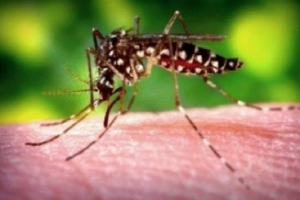Senate Votes on $1.1 Billion Emergency Zika Funding

An Aedes aegypti mosquito is pictured here. The mosquito is one of two in Hawai’i known to spread several mosquito born viruses. Hawai’i Department of Health photo.
A vote on emergency funding to fight the spread of the Zika virus was taken on Tuesday morning in the United States Senate.
Senator Brian Schatz, a member of the Senate Appropriations Committee; and Mazie Hirono both said they voted to advance $1.1 billion in funding.
“Zika is a public health emergency,” said Senator Schatz, who is also a member of the Senate Appropriations Subcommittee on Labor, Health, and Human Services, and Education. “This is our government’s most basic responsibility – keeping us safe. I am glad that senators from both sides of the aisle have finally come together on a deal to provide the critical funding needed to address Zika. These emergency funds will make sure the CDC has the resources it needs to fight the spread of Zika and protect communities in Hawai‘i and across the country.”
The Senate advanced a $1.1 billion bipartisan compromise amendment to the appropriations bill currently being debated on the Senate floor. While the funding is short of the Administration’s $1.9 billion emergency request, the compromise measure will lay a foundation to fight Zika without including cuts to other important public health initiatives as Republicans had proposed, according to Senator Hirono.
“Over 500 Americans have contracted the Zika virus while travelling this year, and with the summer months almost upon us, it is only a matter of time before we see a locally-acquired case,” said Senator Hirono. “While I am a co-sponsor of legislation to fund the President’s full emergency request, the compromise measure advanced today is a good first step to provide states and counties in Hawaii with the vector control, research, and education resources needed to fight Zika. We must remain vigilant and keep ahead of Zika, which has the potential to be a major public health crisis.”
The $1.1 billion in funds will aid in the research on the virus and Zika-related birth defects, as well as support efforts to fight Zika through mosquito control and maternal and child health programs. Funds will also be used to support public education campaigns.
Sponsored Content
Comments








